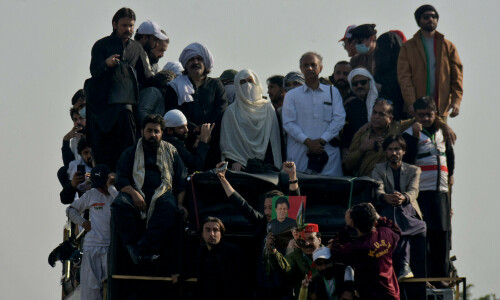WASHINGTON, March 25: Despite the danger that US missile could have been mistaken for those of India and triggered a nuclear war in South Asia , the Clinton administration did not warn Pakistan before launching cruise missiles into Afghanistan in August 1998, a US panel was told.
The issue was raised on Wednesday evening by a member of the commission probing the Sept 11, 2001 terrorist attacks in the United States when he asked the Clinton administration's national security adviser Samuel Berger if they had considered the risk of mistakenly starting a nuclear war between India and Pakistan while firing those missiles over Pakistan's head.
US officials had earlier told the commission that hours after Al Qaeda attacked US embassies in East Africa in August 1998, the Clinton administration decided to launch retaliatory missile attacks at Al Qaeda targets in Afghanistan and Sudan.
"Now, with respect to - in all fairness - the idea of putting a cruise missile there in 6 hours, you had events such as the standoff between the Pakistanis and the Indians, both armed with nuclear weapons.
And the notion of sending a cruise missile over either of those countries during extraordinarily tense times was not something to be lightly done," observed Richard Ben-Veniste, a member of the 9-11 commission.
But Mr Berger said the Clinton administration did not want to warn Pakistan before launching the missile because it feared that the Pakistanis could convey the message to the Taliban.
"When we attacked in August, '98, we obviously did not want to give them advance notice, because we, quite honestly, didn't trust the Pakistani army to not be penetrated. The Pakistani army was the midwife of the Taliban. There were very close relationships," said Mr Berger.
Instead, the US government sent General Joseph W. Ralston, the then vice-chairman of the Joint Chiefs of Staff, to have dinner with Gen Jehangir Karamat, the former chief of the Pakistan Army.
"And as those missiles were heading into Pakistani airspace, Gen Ralston said, by the way, Gen Karamat, at this moment missiles are coming over your airspace, so that the Pakistanis would not read those as incoming missiles from India with nuclear warheads and we'd start a nuclear war," said Mr Berger.
The Clinton administration's national security adviser, however, disagreed with the suggestion that despite this precaution, Pakistan did warn the Taliban before the US missiles landed into Afghanistan.
"I tend to doubt it for the simple reason that we also killed apparently a number of Pakistani intelligence officials who were at the (Al Qaeda) camps at the same time. So one would think that had there been a tip, they would have gotten their own people out. So I have no reason to believe that's true," said Mr Berger.
He said that in 2000 President Clinton traveled to Pakistan to tell President Pervez Musharraf that he should prevent the Taliban from attacking US interests, officials said.
In January 2000, Mr Clinton used various channels to warn the Taliban that he would hold them directly responsible for any future Al Qaeda attacks on American interests, said Mr Berger while explaining how Mr Clinton visited Pakistan.
Mr Berger, who was testifying before the commission in Washington, said: "President Clinton felt so strongly that he traveled to Pakistan in 2000 against the adamant advice of the Secret Service to personally press Gen Musharraf."














































Dear visitor, the comments section is undergoing an overhaul and will return soon.